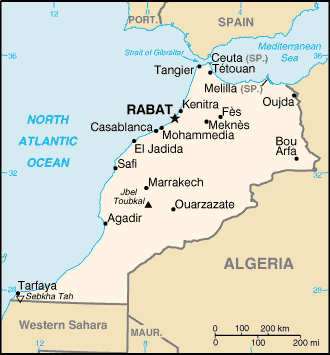Morocco

The Kingdom of Morocco is a constitutional monarchy (increasingly liberal at that) in North-West Africa, just on the far edge of the Middle East.
It became independent in 1956 from France. Before that period, the issue of its being in the French sphere of influence annoyed Germany massively, resulting in the Moroccan Crises of 1905 and 1911.
It currently rules the disputed territory of Western Sahara, where a fragile ceasefire holds sway.
There have been a couple of terrorist attacks in Morocco, targeting symbolic buildings and killing mostly Moroccans and a few Spaniards. Which justified the Moroccan version of the PATRIOT act and allowed the regime to arrest every and any body they want. This has proven so advantageous to it, that the idea that it was actually orchestrated by them is very widespread. It speaks volumes of the jadedness of Moroccans concerning the Palace that they believe it might be true and they still don't care.
Perhaps the reason for this is the 38-year reign of Hassan II, who ran the world's certifiably worst political prison and whose Secret Police put pretty much every other Middle Eastern leader's to shame (particularly during the Years of Lead). He was nevertheless well-liked by most Moroccans; his son, Mohammed VI, is pretty much loved, being actually kinda interested in reform (although he doesn't go quite far enough for some) and attempted to atone for some of his father's harsher policies.
Despite its French legacy, Morocco might fairly be called the Britain of the Arab world: Morocco doesn't seem to like sudden change. Not for nothing is the current (Alouite) dynasty the longest-lasting (400 years!) royal family of a sovereign state outside of Europe and Japan. This tendency was seen most recently during the Arab Spring, where Morocco did see protests--and much as the bobbies didn't (or rather couldn't, as they weren't given firearms) fire on the British protesters in 1848, the Moroccan police kept well away from the protesters in 2011. As a result, the Moroccan protest movement didn't get enough momentum to become a full-on uprising or revolution, and in July 2011, the Moroccan people approved constitutional reforms that put the system of government within shouting distance of democracy (although the king's powers remain extensive).
It is a member of the Arab League, has strong ties with the European Union and is a major US ally, in spite of its population, being the first nation to recognize the United States (the USA have rather bad PR, but with Obama, that might change). However, it is also the only country in Africa that is not part of the African Union, due to the AU recognising the independence of Western Sahara. There may also be a cultural subtext to this: Moroccans steadfastly refuse to think of themselves as "African" -- visit Fes, Marrakesh, or Rabat and ask what continent you're in, and they'll adamantly reply "extremely Southern Europe."

Cities in Morocco:
- The capital is Rabat, a city of broad avenues, nice architecture, and not very much else these days; people live there and have their (often government-related) day jobs there, but there isn't much in the way of shopping or exciting culture. The heart of Rabat is actually its twin city Salé, where many government workers live and which is a bit more interesting. The twin cities do have an interesting history, however; the area was originally settled by Phoenicians, and in the 18th century, Rabat and Salé were famous as a Pirate-run republican city-state.
- The largest city is Casablanca. Casablanca is famous, of course for Casablanca, and indeed it was something of a City of Spies during World War II. Today, it's famous for playing host to a gigantic mosque and having pretty much everything.
- One of the most famous cities in Morocco is Marrakesh, which has a very well-marketed Old City and a booming tourist industry as a result. Expect any scene in Marrakesh to involve at least one person being accosted by a street performer and his trained monkey.
- Fez is Morocco's cultural and religious capital, featuring not one but two Old Cities, the Al-Karaouine University (an Islamic institution of higher learning founded in 859, making it one of the world's oldest universities), and a great number of mosques and institutions of religious learning besides.
- Tangier was a Truce Zone for a very long time, making it yet another City of Spies. Being on the southern side of the Strait of Gibraltar, it has a strong Spanish influence (they even call sandwiches bocadillos).
- Chef Chaouine is famous for the beauty of the Rif Mountains, but foreigners are more attracted to the ridiculous amount of cannabis grown in the surrounding countryside. This region grows an appreciable fraction of the hashish in Europe.
- Essouera is notable as the original home of the Moroccan Navy, although foreigners are more attracted to the musical festivals, the surfing, the fact that Jimi Hendrix liked to vacation there, and the impossibly good and cheap hashish (oh, Europeans...).
- Agadir is primarily notable as Morocco's attempt to recreate Monaco and Dubai all in one. It has a reputation for attracting Eurotrash who can't afford either of those two, but still want to have a debauched time in a place with nice weather. Locals tend not to approve.
Anime and Manga
- Two episodes of the old shoujo anime Hana no Ko Lunlun happen in Morocco, where she helps a Moroccan boy and his grandfather to return to their old village.
Film
- Casablanca
- Part of The Bourne Ultimatum takes place in Tangier, Morocco.
- Marlene Dietrich's first American movie was simply called "Morocco".
- Morocco, logically enough.
Live-Action TV
Video Games
- In Red Alert 2: Yuri's Revenge, Premier Romanov's plane is shot down over Morocco and the Premier takes refuge in the city, finding it surprisingly pleasant by the time the Commander reaches him.